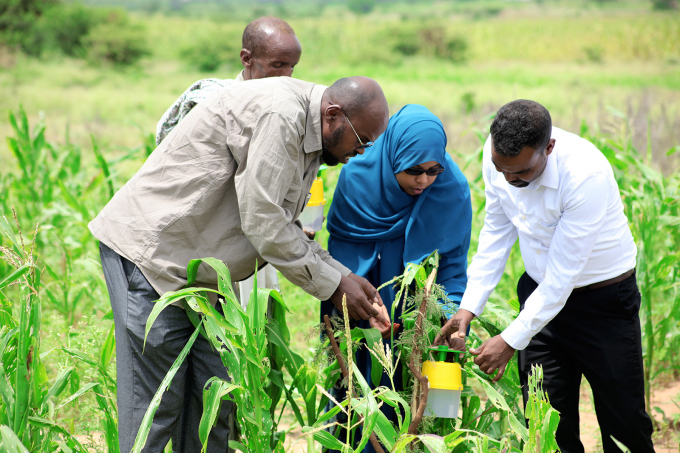June 21, 2025 | 01:45 GMT +7
June 21, 2025 | 01:45 GMT +7
Hotline: 0913.378.918
June 21, 2025 | 01:45 GMT +7
Hotline: 0913.378.918

Protecting plants from pests and diseases is far more cost effective than dealing with plant health emergencies. Photo: Isak Amin
The Food and Agriculture Organization of the United Nations (FAO) has welcomed a UN decision to establish an annual International Day of Plant Health, an issue critical in addressing global hunger as plant pests and diseases cause massive crop losses and leave millions without enough food.
The observance, to be held every 12 May, was championed by Zambia and unanimously adopted by the UN General Assembly in a resolution co-signed by Bolivia, Finland, Pakistan, the Philippines, and Tanzania. The Day is a key legacy of the International Year of Plant Health, which was marked in 2020-2021.
The resolution sets out that healthy plants constitute the foundation for all life on Earth, as well as ecosystem functions, food security and nutrition, adding that plant health is key to the sustainable development of agriculture required to feed a growing global population by 2050.
“The International Day of Plant Health will be an opportunity to highlight the crucial importance of plant health, both in itself and as part of our One Health approach, encompassing human, animal and ecosystem health,” said FAO Deputy Director-General, Beth Bechdol. “It could not be more vital to make sure that we do everything we can to maximize the food resources our planet can provide.”
Pests and diseases cause huge losses
FAO estimates that plant pests and diseases cause food crop losses of up to 40 percent, and the damage they cause to agriculture exacerbates the existing issue of growing world hunger and threatens rural livelihoods. Protecting plants from pests and diseases is far more cost effective than dealing with plant health emergencies. Once established, plant pests and diseases are often impossible to eradicate, and managing them is time consuming and expensive.
“Sustaining plant health promotes food security and nutrition while protecting the environment and biodiversity, and boosting livelihoods and economic growth, in the context of global challenges, particularly climate change,” said Jingyuan Xia, Director of FAO’s Plant Production and Protection Division.
“Making the general public more aware of the role of plant health and the ways we need to act urgently to curb the risks of plant pests and diseases, as well as understanding how to restrict the spread of invasive pests will make a significant contribution to global food security,” said Osama El-Lissy, Secretary of the International Plant Protection Convention (IPPC).
Building on the achievements of International Year of Plant Health, the International Day of Plant Health has five specific objectives:
FAO works extensively to help curb the spread of quarantine and transboundary plant pests and diseases, which have increased dramatically in recent years. Globalization, trade and climate change, as well as reduced resilience in production systems due to decades of agricultural intensification, have all played a part.
Desert locust, fall armyworm, fruit flies, banana disease TR4, cassava diseases and wheat rusts are among the most destructive transboundary plant pests and diseases.
The United Nations announced a decision today to establish an International Day of Plant Health every year on May 12. The decision was championed by Zambia and unanimously adopted by the UN General Assembly in a resolution co-signed by Bolivia, Finland, Pakistan, the Philippines and Tanzania, according to the Food and Agriculture Organization (FAO).
“The International Day of Plant Health will be an opportunity to highlight the crucial importance of plant health, both in itself and as part of our One Health approach, encompassing human, animal and ecosystem health,” said FAO Deputy Director-General Beth Bechdol in a press release about the day. “It could not be more vital to make sure that we do everything we can to maximize the food resources our planet can provide.”
Previously, the FAO hosted the International Year of Plant Health from 2020-2021. This endeavor was used to help promote the importance of plant health, which is a critical issue in addressing global hunger.
“We have great diversity of views, but the goals are the same in many ways,” Michael Keller told Seed World during the Year of Plant Health. “In the end, we all have one goal in common and that is sustainability itself. We must produce more with less and in a sustainable manner … Nobody can achieve this alone. There is a wealth of expertise around us and many groups representing different areas of focus. We must actively engage.”
Each year, the FAO reports about 40% of the world’s agricultural crops are lost to pests and diseases. This costs countries $70 billion annually and causes numerous losses in biodiversity.
This new day will promote that healthy plants constitute the foundation for all life on Earth and help aid food security and nutrition.
(FAO.org)

(VAN) Poultry production in Poland, which has only started recovering from devastating bird flu outbreaks earlier this year, has been hit by a series of outbreaks of Newcastle disease, with the veterinary situation deteriorating rapidly.

(VAN) Extensive licensing requirements raise concerns about intellectual property theft.

(VAN) As of Friday, a salmonella outbreak linked to a California egg producer had sickened at least 79 people. Of the infected people, 21 hospitalizations were reported, U.S. health officials said.

(VAN) With the war ongoing, many Ukrainian farmers and rural farming families face limited access to their land due to mines and lack the financial resources to purchase needed agricultural inputs.

(VAN) Vikas Rambal has quietly built a $5 billion business empire in manufacturing, property and solar, and catapulted onto the Rich List.

(VAN) Available cropland now at less than five percent, according to latest geospatial assessment from FAO and UNOSAT.

(VAN) Alt Carbon has raised $12 million in a seed round as it plans to scale its carbon dioxide removal work in the South Asian nation.